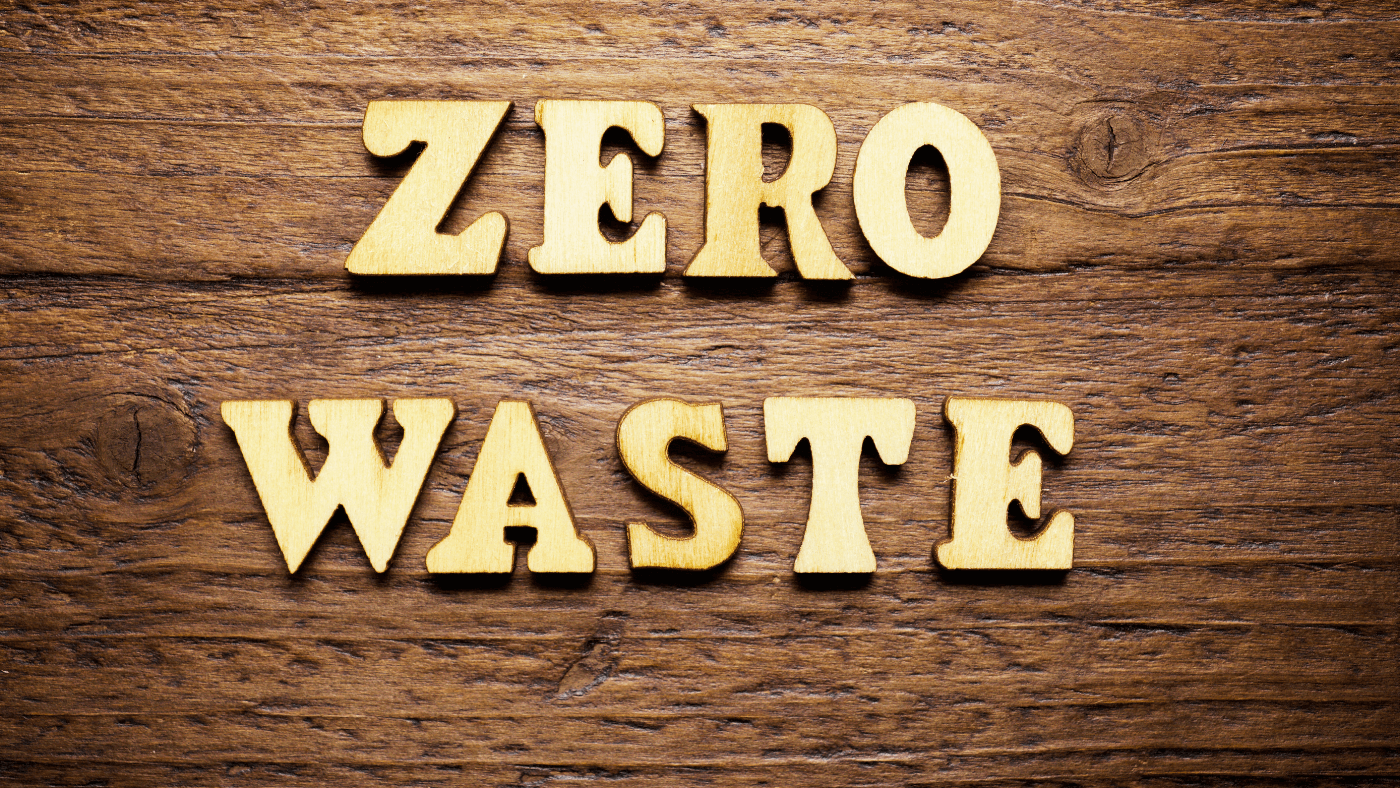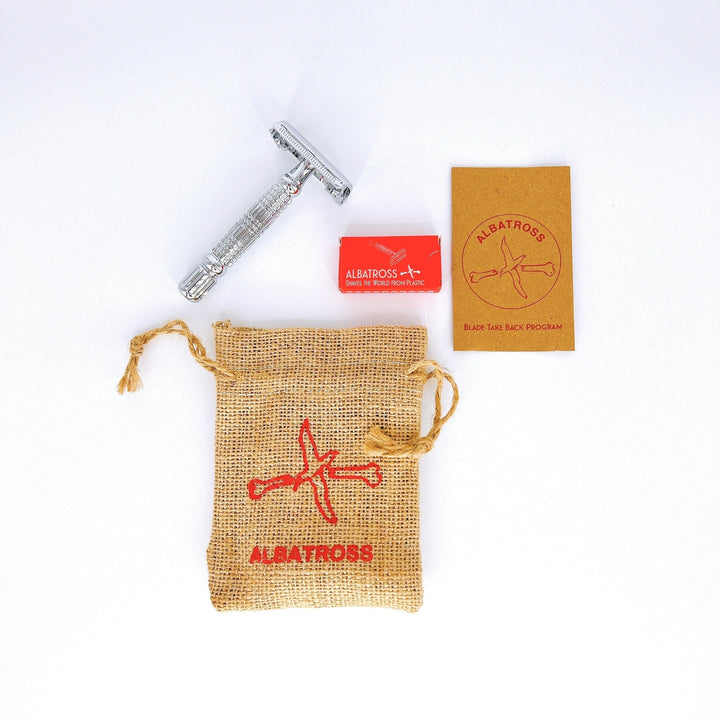As the world becomes more aware of the environmental impacts of consumerism and waste, many individuals are looking to make conscious changes to reduce their ecological footprint. Zero waste living has emerged as a popular solution, advocating for the reduction, reuse, and recycling of materials to create less waste and conserve resources. However, some zero waste habits are so simple, so effective, and so rewarding that it can leave you wondering why you didn’t adopt them sooner.
In this article, we will explore several zero waste habits that not only help the environment but also make everyday life a little easier. These habits are so effective, you might feel guilty for not making the change earlier. Let’s dive into some of the best zero waste habits people have embraced, with real examples of habits that can seamlessly be added to any lifestyle.
1. A Simple, Delicious, and Sustainable Habit
Transforming surplus garden tomatoes into sun-dried delights is a simple and rewarding way to embrace a zero-waste lifestyle. Instead of letting tomatoes go soft and eventually discarding them, you can preserve their rich flavor by drying them in the sun. This easy method not only extends their shelf life for months but also enhances their taste and texture far beyond what store-bought options offer. By adopting this practice, you’ll minimize food waste while adding a delicious homemade ingredient to your meals.
The biggest revelation? Realizing that perfectly good tomatoes could have been saved from the trash all along. Once you experience the joy of making your own sun-dried tomatoes, you might find yourself regretting ever tossing one out. This small yet impactful habit helps cut down on food waste at home, proving that even the simplest changes can make a meaningful difference.
2. Cloth Napkins and Cleaning Rags: The Simple Switch
Another zero waste habit that many people swear by is switching from paper napkins and disposable cleaning rags to reusable cloth alternatives. Cloth napkins are often associated with fancy dinner parties or old-fashioned living, but in reality, they’re incredibly practical and easy to incorporate into everyday life. Many people, however, resist this switch because they think cloth napkins are harder to clean or more inconvenient. But the truth is, once you make the transition and invest in a small stash of napkins, they’re just as easy to use as their disposable counterparts.
Similarly, reusable cleaning rags are often an afterthought, but they’re a game-changer when it comes to reducing waste. The habit is simple—just replace your disposable cleaning wipes with a few cloth rags you can wash and reuse over and over. It becomes second nature after a while. The only challenge for some people is having a washer and dryer at home. But for those who do, it’s a surprisingly easy habit to incorporate—and it feels incredibly good to know you’re eliminating waste with every swipe of the cloth.
Marley's Monsters Unpaper Towels
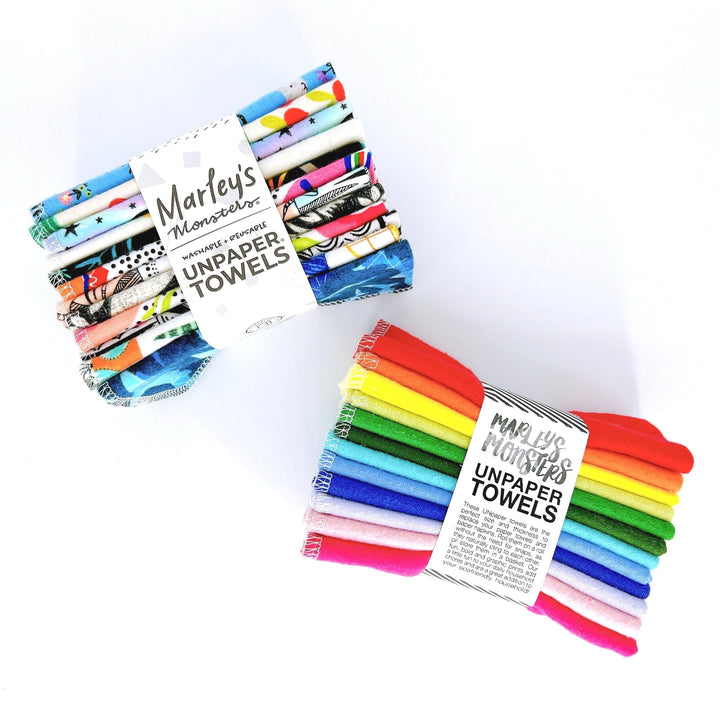
$38.00
The Eco-Friendly Clean-up Crew! Say hello to Marley's Monsters UnPaper Towels—your new cleaning superheroes! Made from soft, absorbent flannel cotton, these reusable towels are perfect for tackling spills, drying dishes, dusting, and everything in between. Crafted from 100% cotton, they're… read more
3. Freezing Leftovers: A Simple Solution to Food Waste
Food waste is one of the most significant contributors to waste in landfills. For those who struggle with finishing leftovers, freezing them can be a game-changer. One person shared their experience of having a difficult time keeping leftovers more than a day or two in the fridge. They used to throw out food with a heavy heart, knowing that they were wasting both money and resources. But then, they had a “lightbulb” moment and realized that they could freeze leftovers instead of letting them go to waste.
By freezing leftovers, they were able to store food for later, ensuring that nothing went to waste. It made them feel much better about not throwing away food that could still be used in the future. This simple switch is a no-brainer for anyone trying to adopt zero waste habits—it’s easy, it saves money, and it helps reduce food waste in the long run.
4. Air Drying Clothes: A Money-Saving, Eco-Friendly Habit
Many of us are used to tossing our clothes into the dryer, but it turns out air drying clothes can be just as effective, especially if your dryer is inefficient or expensive to use. One individual shared their story of using their apartment's communal dryer, only to find that their clothes were still damp even after paying $2.50 per load. Frustrated, they decided to try air drying their clothes on a drying rack instead—and never looked back.
Air drying not only prevents the need for excessive energy use, but it can also preserve the lifespan of your clothes. Fabric softeners and harsh dryers can wear out clothing much faster, whereas air drying keeps them in better condition. This is one habit that feels completely natural once you start—air drying takes no extra effort, and it’s an easy way to lower your environmental impact while saving a little cash on your utility bills.
Wooden Clothespins
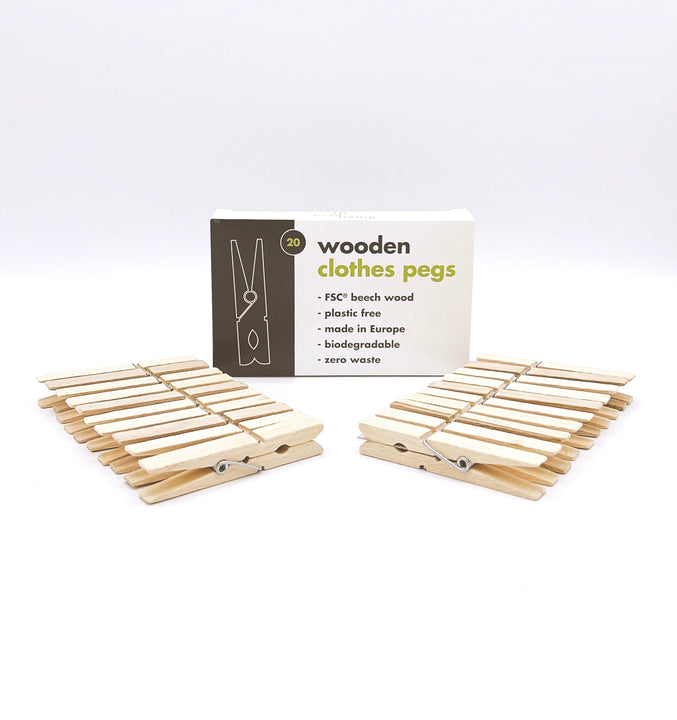
$7.00
Pin It with a Purpose Meet your new favorite laundry helper: Wooden Clothespins made from premium FSC Beech wood! These timeless clips are not just practical; they’re also a sustainable choice for all your drying and crafting needs, perfectly suited… read more
5. Switching from Body Wash to Bar Soap
Many of us grew up using body wash in plastic bottles, not even considering that there might be an alternative. But when the realization hit that bar soap comes without plastic packaging and lasts longer, it sparked a change. A switch to bar soap is one of the simplest zero waste habits to adopt—and it’s surprising how many people don’t make the change sooner. The realization can be a bit of a "lightbulb" moment when you think about how much plastic you could have avoided over the years. The best part is that bar soaps come in a variety of natural, eco-friendly options that are both gentle on your skin and the planet.
It may sound silly to some, but for many, the change to bar soap feels like a game-changer—and one that’s almost too easy to implement once you realize just how wasteful the alternative is.
Mountain Time Soap

$9.00
Discover Pure, Clean, Mountain Time Goodness! Meet your new skincare essential! Mountain Time Bar Soap is handcrafted with a perfect mix of natural ingredients like olive oil, shea butter, and essential oils. It’s your ticket to a gentle, nourishing cleanse… read more
6. Safety Razor: The Sustainable Shaving Habit
7. Reusable Coffee Filters: The Pour-Over Coffee Game-Changer
For those who prefer pour-over coffee, using reusable cloth or metal filters is an incredibly simple yet impactful zero waste habit. Traditional coffee filters are usually made of paper, which adds to waste and can take a toll on the environment. But with reusable filters, you can reduce waste while still enjoying your perfect brew.
Some coffee enthusiasts prefer metal filters over cloth, as the cloth versions can filter the coffee a little too well, leaving behind some of the robust flavors. A metal filter allows for more oils to pass through, creating a richer, fuller taste. And when you’re done, the used coffee grounds can be composted, used to deodorize your sink disposal, or even repurposed in your garden. This zero waste habit is a must for any coffee lover looking to cut down on waste without sacrificing flavor.
Reusable Coffee Filter
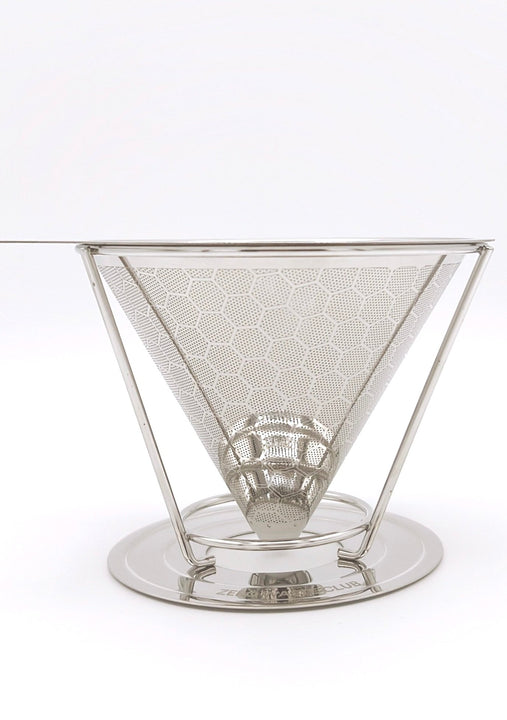
$30.00
Brew Better with Our Reusable Coffee Filter! Ditch the disposable paper filters and go green! This reusable coffee filter is an eco-friendly product that significantly reduces waste. By choosing this filter, you’re making a sustainable choice that supports a zero-waste… read more
8. Bringing Tupperware to Restaurants: No More Takeout Containers
Many of us are familiar with the ritual of getting takeout or restaurant leftovers packed in styrofoam or plastic containers. But one zero waste habit that’s gaining popularity is bringing your own reusable containers to restaurants when you know you’ll have leftovers. Instead of accepting disposable packaging, you can save those containers and ask the server to place your leftovers directly into your own Tupperware.
This habit may take a bit of getting used to, but it’s a great way to avoid the need for single-use containers. Plus, it ensures that your leftovers are stored safely without the unnecessary waste. It's a simple practice that can make a noticeable difference when it comes to reducing waste.
9. Reusable Produce Bags: A Simple Yet Impactful Change
For those who shop for fresh produce regularly, one of the simplest zero waste habits is bringing reusable produce bags to the store. While plastic bags are often provided by supermarkets for fruits and vegetables, many individuals are now making the switch to reusable cloth bags instead. This habit is especially popular among those who are trying to eliminate plastic from their daily lives.
The practice is easy to implement—simply bring your reusable produce bags with you when you go shopping. Over time, these small actions accumulate, and it becomes second nature. Not only does it reduce plastic waste, but it’s a great way to support sustainable living without requiring significant lifestyle changes.
EcoBags Large Produce Bag
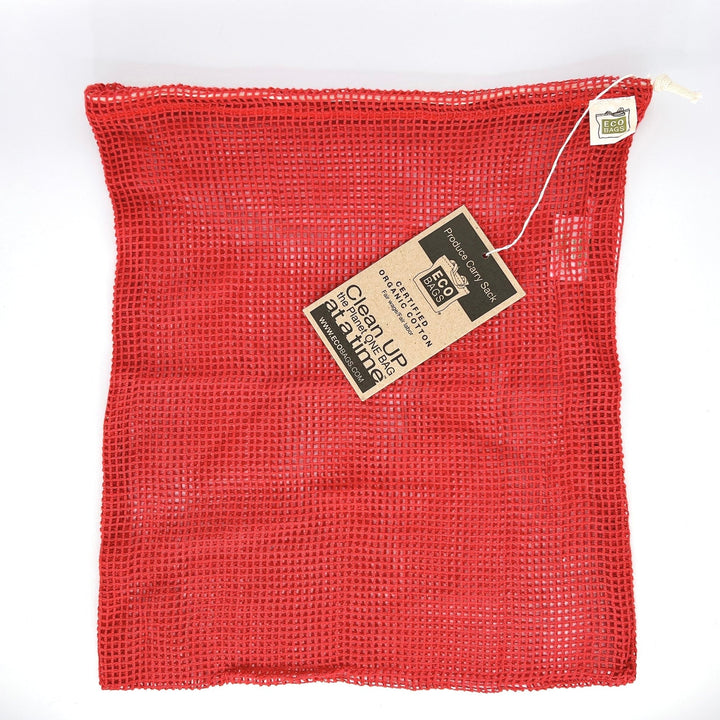
$7.25
Your Essential for Eco-Friendly Shopping Discover the EcoBags Large Produce Bag, a must-have for anyone committed to zero waste shopping. Made from 100% organic cotton, this bag highlights your dedication to sustainable goods, free from harmful chemicals and dyes. Ample… read more
Small Businesses Leading the Refill Revolution
In recent developments, small businesses are leading the charge in sustainability by offering bulk refill stations for self-care, beauty products, and grocery dry goods. This initiative allows customers to refill their containers, significantly reducing single-use packaging waste.
For example, Simply Bulk Market in Longmont, Colorado, provides a wide selection of bulk foods, spices, and personal care products, encouraging shoppers to bring reusable containers.
Similarly, Rustic Strength manufactures refillable, plant-based cleaning and wellness products and supplies numerous bulk refill locations across the country. Their mission focuses on reducing toxins and promoting sustainable living through refillable options.
These small businesses exemplify a growing shift toward sustainability, providing communities with accessible, waste-reducing solutions that align with the zero-waste movement.
Small Changes Lead to Big Impacts
Adopting zero waste habits doesn’t require a complete overhaul of your lifestyle. Often, the best habits are simple, low-cost changes that make a significant difference. Whether it’s drying your clothes, freezing leftovers, switching to bar soap, or using reusable produce bags, these habits help reduce waste and encourage a more sustainable way of living. As we become more aware of the environmental impact of our daily actions, it’s easier than ever to incorporate these simple habits into our routines.
Once you embrace these habits, you may even wonder why you didn’t start sooner. And while some changes might seem small, they all add up over time, contributing to a more sustainable world for future generations.
Embracing Zero Waste
Making the shift toward zero waste living doesn’t have to be daunting, and small steps can lead to big changes. At Mudd House Mercantile, we understand that the process of reducing waste can feel overwhelming at first, but we also believe that incorporating zero waste habits into your daily routine is more accessible than ever.
Our goal is to offer products that make zero waste living simpler and more sustainable, whether you’re just starting or have been on this path for a while. From reusable bags to natural cleaning supplies, our carefully chosen items are designed to help you reduce waste without compromising on quality or effectiveness.
Zero waste living is about making conscious, mindful decisions. No change is too small, and every step counts. Together, we can create a more sustainable world, starting with our own homes and communities.

